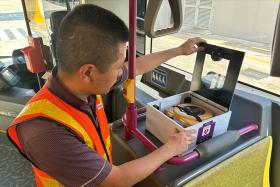Full speed ahead for car-sharing in Singapore?
As fewer people see the need to own a car, car sharing has gained more fans recently
Tomorrow, the first fleet of 80 electric Bluecars will hit the roads as part of a public car-sharing scheme by BlueSG.
The subsidiary of French conglomerate Bollore has big dreams: It aims to expand to a 1,000-strong fleet and become the world's second largest electric vehicle car-sharing service, after the one in France.
The pay-as-you-drive transportation service has its roots in Europe, where large-scale services such as Mobility CarSharing Switzerland emerged in the late 80s. To date, it has a fleet of 2,950 vehicles and serves 131,700 customers.
Here, the idea was first floated by then transport minister Mah Bow Tan in the 90s.
He reasoned that communal cars were more efficient and affordable than private ones left parked the whole day while the owner was in the office.
Since then, the car-sharing scene has seen mixed fortunes.
Car Co-op, pioneered by NTUC Income in 1997, was liquidated in 2010 as part of the local insurance giant's series of moves to get out of non-insurance businesses.
It now exists as Car Club.
In 2007, ComfortDelGro pulled the brakes on its CitySpeed Car Sharing after five years. Falling car prices made the business less viable, it said.
A year later, Japanese carmaker Honda said its then six-year-old car-sharing scheme Diracc had become too unwieldy to maintain service standards.
There are at least five car-sharing operators in the market running on different models.
Car Club works on a station-based model where users pick up and drop off the car at the same location.
For Smove and BlueSG, users can pick up and return the car at any of the designated locations.
The cars are parked at lots designated by the Housing Board.
Unlike renting a car, petrol and insurance are usually included in car-sharing.
FUSS-FREE
Attracted to the fuss-free approach, convenience and minimal paperwork, Madam Fadzlina Sujak, 41, started using Smove cars last year.
Now, they (millennials) are not very much into car ownership, which is one of the five Cs we used to talk about in Singapore.National University of Singapore’s Associate Professor Lee Der Horng
Her family members' cars were scrapped last year after the certificates of entitlement expired, she told The New Paper.
The service came in handy during Hari Raya a few months ago; the polyclinic coordinator and her family used a Smove car to go to their relatives' place at Choa Chu Kang from their Punggol flat.
It cost them just $50 to hold the car for three hours - cheaper than a one-way Uber ride, which came up to about $58 due to surge pricing. It was also faster than the hour-long train ride they would have had to take.
In recent years, more people like Madam Fadzlina have been opting for car sharing, operators told TNP.
Car Club saw its members grow from about 4,800 in 2010 to almost 8,000 today.
Managing director Gary Ong attributed it to more awareness of car-sharing services.
"Car sharing is quite driven by awareness of this service in the market...
"I do see awareness improving in recent years because mobile devices have penetrated society. The car-sharing (process) has evolved from manual to fully automatic," he told TNP.
With options such as BlueSG, Transport Minister Khaw Boon Wan hopes car sharing will feature more in the near future as Singapore moves towards being car-lite.
Most people will not see the need to own a car and instead rely on public transport, Mr Khaw said.
"Car sharing allows more people to have access to a car without needing to own one," he said in June last year in a speech at the signing ceremony for BlueSG.
Noting the relatively small size of Singapore's car-sharing market as compared to Europe and the US, he added: "We hope to see car-sharing usage rise through collaborations such as this one we are signing today."
Car Club tries to encourage car-sharing usage by developing the service as a "mobility lifestyle product" and offering it on a subscription basis, said Mr Ong. The company also ties up with partners in the lifestyle space - think restaurants and leisure facilities - to give their members exclusive perks.
"We build the lifestyle and make car sharing a more attractive option than just owning a car," he said.
Smove and Tribecar allow clients to use the shared cars to provide private-hire services.
This helps make car-sharing more efficient, said Smove chief operating officer Joseph Ting, who said utilisation is "lumpy" - demand is much higher on weekends - and allowing users to use the shared cars for income helps fix that.
Tribecar is also looking at van sharing to ride on the wave of commercial deliveries.
"E-commerce is booming, with Alibaba and Amazon competing against each other. We are happy to partake in this competition," its co-founder Adrian Lee told TNP.
The fact that Singapore's love affair with cars is stalling, at least among millennials, could work to the car-sharing operators' advantage, said National University of Singapore's Associate Professor Lee Der Horng.
The transport researcher told TNP: "Based on our survey in recent years, I think the public is getting practical about car ownership, especially among the younger generation.
"Now, they are not very much into car ownership, which is one of the five Cs (cash, credit card, car, condo, country club membership) we used to talk about in Singapore. Many of them do not want to take up the trouble."
This trend is mirrored in Tribecar users whose ages are "predominantly below 35".
Smove sees a client base aged between 27 and 42 years old - "staying in the outskirts, got their first flat or cannot afford a car, and are savvy enough to try out a new service like Smove", said Mr Ting.
Given the high cost of private vehicle ownership and dense land-use patterns here, car sharing shows promise as a cost-effective transportation alternative, a 2006 study published in the Transportation Research Record has found.
But in the long run, the major solution to a car-lite Singapore still lies in a reliable transport network - one the Government has heavily invested in.
Car sharing, along with alternatives such as ride-sharing and taxis, are smaller pieces in a big puzzle.
The edge it has over ride-sharing and taxis is the assurance car sharing brings, Prof Lee said.
"Getting a private-hire car or a taxi depends on whether we are able to get it or not. Sometimes, people like to have the active control. Car sharing can fill this gap."
But the industry can pick up steam only if car sharing becomes accessible and convenient to all - something that can be changed by growing a fleet size, Prof Lee said.
"If I am a potential user and the car-sharing service can be available whenever I want to use it, and there are savings, I think people will respond to this. When it comes to transportation, it still boils down to travel cost and time," he said.
Expanding the total shared fleet can ensure convenience in the form of increased pick-up and return locations, which will help car sharing take off, Prof Lee added.
Madam Fadzlina considers herself lucky to be able to access a Smove car a few blocks away.
"Car-sharing services go hand in hand with Singapore's transportation plans," she said. "When the weather is so hot, and (your other option is to wait in) a long taxi queue carrying many things, car sharing is a godsend."
Car-sharing at a glance
CAR CLUB
Members pay a one-time registration fee ($100) and a monthly membership fee ($10.70). Prices are for members who use a car from an economy car group about a few times a month.
- First hour: $9 on weekdays, $10 on weekends/public holidays
- Next 15 minutes: $1.75 on weekdays, $2 on weekends/public holidays
- 24 hours: $75.50 on weekdays, $98 on weekends/public holidays
SMOVE
Smove cars can be driven for Uber but mileage charges apply.
- 3 hours: $50
- 6 hours: $90
- 24 hours: $150
If you drive for Uber:
- 6am-11am, 5pm-10pm: $6/hour
- 11am-5pm, after 10pm: $4/hour
TRIBECAR
Tribecars can be driven for Uber and Grab. Prices reflected are for an economy sedan car.
- Midnight-6am (Monday-Friday): $2.14/hour
- 6am-7am, 11am-5pm, 11pm-midnight (Monday-Thursday); 6am-7am, 11am-5pm (Friday): $4.82/hour
- 7am-11am, 5pm-11pm (Monday-Thursday); 7am-11am, 5pm onwards (Friday); Whole day (Saturday, Sunday): $6.96/hour
BLUESG
Users can choose between a yearly premium membership with a fee of $15 a month or a weekly membership with no recurring fees.
- Yearly membership: $0.33/minute for a minimum of 15 minutes
- Weekly membership: $0.50/minute for a minimum of 15 minutes
Get The New Paper on your phone with the free TNP app. Download from the Apple App Store or Google Play Store now




